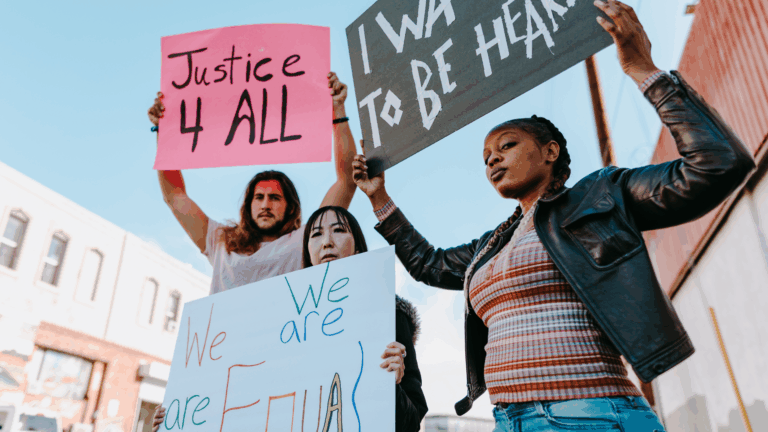Let’s start with a definition so we can all be on the same page as we start this conversation. When I say “historic sexual ethic,” I’m referring to a belief that God’s best for every Christian is either vocational singleness (lifetime vocation of abstinent singleness for the sake of doing kingdom work with undivided attention) or Christian marriage (lifetime vocation of opposite-sex Christian marriage with an openness to raising children for the sake of the kingdom).
Like many of you, I grew up in the Church. I was told God was good and His design for sexuality was true, but no one ever told me it was beautiful. I heard shame. I heard silence. And when I realized I was attracted to other guys, I assumed something about me had to change for God to love me.
I chased every formula to become straight. None of it worked. But in the process, I discovered something better: Jesus didn’t ask me to become someone else. He invited me to trust His design—and to believe that His boundaries weren’t a punishment but a gift.
So this article isn’t about arguing against something. I’m not writing to rant about culture or critique someone else’s life. This article is an invitation to consider a better story: the historic Christian sexual ethic, a vision for sexuality that isn’t just true, but good. That still heals. That still leads to life and that offers us, in both vocational singleness and Christian marriage, a way to flourish.
How’d I get there?
Before college I was ashamed of being gay, afraid others would find out and treat me poorly. I grew up being taught and believing ex-gay theology, and because of that, between the ages of 13 and 23, I prayed hundreds of prayers, went to over a hundred hours of counseling with a therapist who thought he could change my sexual orientation, and spent nine months with a pray-the-gay away ministry.
But I’m still gay.
That didn’t seem to be how God thought about these things. Plus, I grew up hearing that every biblical Christian believed that God was against homosexuality and was taught that God’s wisdom in Scripture is self-evident to every Spirit-filled Christian and all come to the same conclusion.
Then I got to college at a top-fifteen university and met smart, Jesus-loving peers who had different interpretations of Scripture, which was disorienting for my sexual ethics. The simplicity of a self-evident Bible crumbled, disorienting my sexual ethics and my whole understanding of God’s wisdom. I had a crisis of faith: How do I know God’s wisdom? Can I know God’s wisdom? Is God even real if so many disagree? I dealt with serious doubt that nearly destroyed my faith.
Doubt continues today, but I choose to live with doubt as opposed to allowing it destroy my faith, and I dug deeper for better answers. How do I know what God’s wisdom is, particularly if the Bible isn’t self-evident? If human interpretation is unavoidable? Some say we can just trust what the Holy Spirit seems to be revealing to each of us, but what happens when two Spirit-filled Christians come to mutually exclusive conclusions? One of them isn’t actually hearing from the Holy Spirit, but how do we know which one?
At the time, a friend quipped, “It’s either a pope in Rome, a pope in the mirror, or something in between. Choose your pope!” I wasn’t Catholic, but I also didn’t trust my own interpretations over the next human’s. So I explored the in-betweens in Christian history. As I studied, I was struck by Christ’s promise that He would give us the Church, led by His Apostles and their successors, to teach the Scriptures and lead His people. And I was surprised to learn that a vast majority of Christians throughout history have believed that the most trustworthy human interpreters are those Church leaders who can trace their authority back to the Apostles.
To be clear, most Christians haven’t believed the Apostles (or their successors) teach perfectly. But if I personally arrive at a different interpretation than the strong consensus of the successors of the Apostles on a particular theological question, then I’m probably mistaken. After that, the question of sexual ethics was fairly easy.
You see, I think disagreement about sexual ethics is rarely really about sexual ethics; usually, it’s actually about disagreement on one of three more fundamental questions:
- Does God exist?
- Does that God know what’s best for me better than I do?
- Do I know God’s best by reading the Scriptures with the historic Church?
To be honest, I’ve yet to meet someone who also says “yes” to each of these questions but comes to meaningfully different conclusions about sexual ethics. And I think that would be my top-line recommendation to you. Ultimately, what you believe about sexual ethics is going to be determined by your framework for interpreting Scripture. I beg you, don’t let the tail wag the dog. Don’t let yourself become convinced of one sexual ethic or another for emotional reasons or even seemingly intellectual reasons and then reverse engineer a framework for interpreting Scripture that leads to the sexual ethic you want to hold.
Instead, figure out your church’s framework for interpreting Scripture, and my hunch is, after you have that, the rest will be easy.
So for me, when I read the whole of Scripture, with the historic Church, there’s overwhelmingly more evidence for historic sexual ethics than for ex-gay theology or a revisionist sexual ethic. And listen, I tried both. I tried to convince myself of both, and I’ve tried to live out both, but as I’ll share more later, my story and the story of so many others confirms that both of those are dangerous extremes.
What do I believe?
First, I believe that experiencing same-sex attraction, people finding other people of the same sex physically attractive and desiring romantic relationships with them, or being gay, are a result of the Fall. When Adam and Eve chose to disobey God, their sin led to a domino effect of brokenness, bending all of the ways God had perfectly designed and ordered this world to the extent that this world around us, the people around us, and even we ourselves are not how God first imagined us. None of us are how God intended. Regardless of sexual orientation, we are all corrupted at a genetic level, developed imperfectly in our mother’s womb, and were born into a broken world that wounded us long before we ever gained the capacity to sin.
So, I don’t think that when God first imagined me and projected me being born into a perfect world He planned for me to experience same-sex attraction. But because I was born into a broken world, one of the ways I was affected by that brokenness is that I gained these attractions.
I want to be clear, though, that being gay, experiencing same-sex attraction, is not a sin. It is a brokenness, a temptation to sin, but God doesn’t hold against anyone their involuntary thoughts. God does not send people to hell merely because boys are attracted to boys or girls are attracted to girls.
Also, there’s a big difference between attractions, orientation, identity, and behaviors, and when Christians on either extreme conflate these, it causes big problems. Same-sex attractions can be nothing more than infrequent or one-time recognition that someone of the same-sex is physically or sexually attractive. A same-sex sexual orientation is a consistent pattern of same-sex attractions. Same-sex sexual identity involves identifying as gay either by name and/or by participating in gay culture in ways that can be small like putting a rainbow sticker on one’s car. Same-sex sexual behavior consists of romantic and sexual activity.
A Christian can experience infrequent same-sex attractions but not have a same-sex sexual orientation. A Christian can have a same-sex sexual orientation but choose not to identify as gay. A same-sex attracted Christian can identify as gay but choose not to engage in same-sex romantic and sexual activity. But the extremes in the conversation want to deny that that nuance is possible. Those on the Left argue that all of these must line up in a particular direction or the person is practicing self-hate. And people on the Right argue that in order to faithfully refrain from gay sex, a person must also find a way to eliminate their same-sex attractions or at least pretend they don’t experience them anymore.
I also don’t believe people choose who they are attracted to (choose to be gay or straight), but we do choose how we respond.
The consensus of scientists is that people develop their sexual attractions through a mix of nature and nurture, but people do not choose to whom they are attracted. There is also no formula for changing a person’s attractions. There’s no proven combination of prayer or counseling or weekend retreats to change someone’s sexual orientation. Certainly God has the power to do whatever He wants, but scientific studies show that 96% of people who seek sexual orientation change efforts experience no change in their sexual orientation, but they do experience a 92% increase in suicidality due to sexual orientation change efforts (nearly doubling suicide attempts).
Now at this point, many people reasonably ask: if same-sex attractions are broken and God didn’t intend for anyone to be gay yet God allowed that brokenness to develop and rarely heals that brokenness when people ask Him for healing, how is that fair? At the core of that question is the timeless question: why do bad things happen to innocent people? Because people don’t choose their sexual orientation, and gay people haven’t done anything to bring about their sexual orientation, they’re innocent.
So why?
In order for us to have real choice and true agency to choose to love God and other people, God lets the consequences of our decisions play out. It’s the theological concept of free process. If God just swooped in and protected each of us from the consequences of the sins of others, would their choices have been real choice? No. So in order for our love for God and each other to mean something, God chooses the greater good of allowing things to play out.
How does that apply to broken sexuality? I believe that gay people developed this brokenness because of the sins of others. Brokenness in their genes passed on through generations. Sin in the different environments they grew up in. And to protect free will, God chose not to swoop in and prevent them from developing same-sex attractions by blocking the consequences of the decisions of others. Thankfully, God has promised us (and I’ve absolutely seen it to be true in my life) that He is faithful to redeem our brokenness for His glory and our good.
What does the Bible have to say about all of this?
As I understand it, and as a majority of Christians have understood the Bible for 2,000 years, God’s best for every Christian is either vocational singleness or Christian marriage. There is no context for same-sex sexual or romantic activity that God blesses in Scripture. Same-sex sexual and romantic activity are sins in any context. What I hope you notice is that I’m staking out a moderate, middle-way position here. I’m rejecting a revisionist sexual ethic that abandons historic biblical wisdom to one extreme. And I’m rejecting pray-the-gay-away theology that’s caused thousands of suicides on the other extreme. Instead, I’m holding on to both compassion and conviction.
What is truly convincing is not the six “clobber passages” in the Bible but the whole of Scripture. Consistently, Scripture reveals God’s design for our lives and God’s order for the world, even in the midst of brokenness. When it comes to what to do with our capacity for romance and sex, God seems to be pretty clear: there are two options for all Christians: vocational singleness or Christian marriage with someone of the opposite sex. Jesus and Paul had a lot to say about both of these options, and they praised both and described both as having a specific design.
In Matthew 19 and 1 Corinthians 7, they spoke of a committed singleness, where one gives up romance and marriage and sex to do kingdom work parents have a hard time finding the time and energy to carry out. And in Matthew 19 and Ephesians 5, Jesus and Paul spoke of Christian marriage as a lifelong partnership between a Christian man and woman for the purposes of enjoying intimacy with each other, raising children, and embodying the gospel.
You see, the Christian should not approach God or the Bible with the question, “What is permissible, when it comes to my sexuality? What can I get away with?” Instead, we should ask, “What is most wise and most good? What is God’s best when it comes to my sexuality?” God’s best for how all Christians should steward their sexuality is clear: vocational singleness or Christian marriage with someone of the opposite sex. I’m not interested in settling for anything less than God’s best.
But beyond theology, there are compelling reasons to follow God’s wisdom as we understand it.
On the one extreme, pray-the-gay-away theology has caused millions to lose their faith or their life. Then on the other extreme, even if I could somehow convince myself theologically that God would bless a same-sex marriage between two Christians, I can’t ignore the bad fruit of a progressive sexual ethic in my life and the lives of others. Primarily, most of my gay Christian friends who adopted a progressive sexual ethic eventually stopped believing in God.
Many of them follow a sad, but logical trajectory: at first, they perform theological acrobatics to read the Bible in support of same-sex marriages. Then after a while, they reluctantly agree with a majority of queer theologians who say that the Bible probably says what Christians have understood it to say for 2000 years: the God of the Bible condemns gay sex and gay marriage.
Yet, these gay Christians continue to believe that the real God supports gay marriage. The Bible is just outdated and lacks authority or relevance for modern people, they say. But once they decided that the Bible and the Church couldn’t tell them who God is, they realized they were just worshiping a god they came up with in their own minds. They wondered, “What’s the likelihood that the god of my imagination is real?” Eventually they stopped believing in God all together. Today, very few of the gay Christians I know who have followed a revisionist sexual ethic for at least five years can make an unqualified confession of an historical understanding of the Nicene Creed and denounce mutually exclusive claims.
Then in the middle of these two extremes, how does a compassionate embodiment of historic Christian sexual ethics impact mental and spiritual health? Research by Olya Zaporozhet and Mark Yarhouse published in 2019 found that gay celibate Christians scored in the normal range of mental health compared to the average American. And then gay celibate Christians scored higher than average overall life satisfaction. While limited, this evidence suggests that a compassionate historic Christian sexual ethic promotes mental and spiritual health, unlike theological extremes in each direction.
So, if your primary concern is the health of kids and teens, don’t be fooled into thinking you must abandon God’s wisdom or compassion. Embrace both and take practical steps to help gay people in your church steward their sexualities in God-honoring and life-giving ways!
Okay, so maybe embodying God’s wisdom in the best ways can actually be good, but historically, has it been fair?
Admittedly, no.
Many churches lead straight Christians to assume that they will get married, teach that we need romantic companionship to be happy and ignore the Bible’s teachings about vocational singleness and divorce. But then these same churches call gay Christians to a higher standard of sexual stewardship by teaching that gay Christians don’t need romance or sex and challenging them to consider vocational singleness. This inconsistent, hypocritical application of Scripture tempts sexual minorities to adopt a victim mentality and reject sexual morality standards because of the apparent double standard.
Churches lose credibility to ask gay Christians to live according to biblical wisdom when they refuse to hold straight Christians accountable to that same wisdom. Yet, this inconsistent standard hurts straight Christians as well. Straight Christian marriages end in divorce at the same rate as non-Christian marriages, and unmarried straight Christians suffer from a lack of support in their churches.
All of this has led to bad fruit in the lives of gay Christians trying to steward their sexualities according to a historic sexual ethic. They are lonely and struggle with sin, and this affects their relationship with God and the Kingdom work they could do, not because they aren’t trying hard enough and not because God’s wisdom is actually a lie, but because even the churches that believe in God’s wisdom have done a horrible job embodying that wisdom in a way that would allow faithful gay Christians to actually thrive.
I think that’s the double burden of gay Christians: the Church doesn’t know how to love us well, and the alternatives culture offers still aren’t good for us, either. Yet, that doesn’t make something bad for me good for me. That doesn’t change something from being a sin to being edifying to God. Why is this the way God made things? I don’t know, but at the end of the day, it’s not my job to question God or tell Him how to do His job. I’ve just got to trust that God knows what is best for me and obey His teachings. I don’t think the solution to the bad fruit we see is to abandon a historic sexual ethic because there’s even worse fruit of a revisionist sexual ethic.
No, the solution is for Christian communities to do a better job teaching what the Bible has to say and embodying it in ways that lead to thriving in the lives of gay Christians following a traditional sexual ethic and, in the process, bless every Christian in your community.
The solution
First, your community needs to invite everyone to think theologically about their sexual stewardship. You need to teach that God first calls everyone to a period of temporary singleness during which they discern whether they are called to vocational singleness or Christian marriage with someone of the opposite sex. Your community should teach that every Christian has the same inherent capacity for both vocations and every Christian, gay or straight, should offer the question of vocational singleness or Christian marriage to God. And then your community needs to come around gay and straight people to help them faithfully live out vocational singleness or Christian marriage.
Second, your community must talk publicly about the cultural questions in the intersection of faith and sexuality. Many churches avoid the topic of God’s love for gay people, so the average church-goer doesn’t know how to have compassionate and theologically accurate conversations with friends. As a result, gay people don’t know whether it is safe to share their story. Churches that refuse to speak publicly about God’s love for gay people hurt gay Christians, and their indecision limits their ability to invest in something better. Instead, churches must talk publicly about the cultural questions in the intersection of faith and sexuality. With compassion and theological accuracy, churches need to explore the following questions:
- How does same-sex attraction develop?
- What part did God play and why?
- Does same-sex attraction change?
- How should gay people meet their intimacy needs?
- How do gay people fit in God’s story?
- How is God’s invitation to gay people good?
As a result, everyone in a church would know how to love gay people well and reflect the love of Christ in conversations about sexuality. Plus, gay people in a church who are not out yet would know what the church believes and that it is safe to share their story.
Third, churches must protect kids from the wounds of the closet. Many churches wait until a kid shares that he or she is gay to address the topic of homosexuality. This is a problem. Gay teens spend an average of five years in the closet, making sense of their sexuality, often without the love and wisdom of parents—left alone with the lies of the Enemy and culture, which leads to loneliness, anxiety, shame, depression, sexual sin, addiction, abandoning God’s wisdom, suicide, and loss of faith. Gay teens are five times more likely to attempt suicide than their straight peers, and 54% of gay people have left the church. The wounds of the closet become the greatest barrier to gay Christians thriving according to a historic sexual ethic, haunting them for a lifetime. If we wait for kids to come out to us to share about God’s love and wisdom for gay people, it will be too late.
Instead, churches must equip parents to lead kids ages 2-12 in age-appropriate conversation about God’s wisdom for everyone’s sexual stewardship before puberty, demonstrating safety and inviting children to share early about their sexuality. If teens hear before puberty that gay people don’t choose who they are attracted to, that they have nothing to be ashamed about, that we won’t try to fix them, that we don’t love them any less, and that God has good and beautiful plans for them. Then hopefully when some teens realize they experience same-sex attractions, they’ll quickly share with their parents and pastors, inviting them to help them learn how to steward their sexuality in God-honoring ways and preventing the wounds of the closet from ever being inflicted.
Fourth, pastors and other leads need to know how to offer compassionate one-on-one pastoral care to LGBT+ people. Many parents and pastors first react to teens sharing about their attractions by sending teens to a therapist or a para-church ministry outside of the church to be “fixed.” Parents and pastors don’t know how to minister to gay people well, so they outsource the care. The shame and loneliness of gay people is amplified because their challenges are treated as weird problems that need special treatment. They are told to make sense of a key aspect of their personhood away from the church family they worship with, pray with, and take communion with.
Instead, churches must provide effective pastoral care to gay Christians. They need to do what it takes to gain the competency to provide pastoral care to gay people. While licensed counselors still may be included to help address clinical levels of anxiety or depression, these churches must recognize that same-sex attractions are not a mental illness to be cured. Parents and pastors should help gay people integrate their faith and sexuality in ways that lead to thriving in this life and deep relationships with God and friends.
And last but not least, churches must become places where LGBT+ people can thrive in vocational singleness or a mixed-orientation marriage with reasonable effort. Many churches may have the right beliefs about sexual ethics, but the pathways for sexual stewardship they offer are inviable. They are places where few are thriving in vocational singleness or the complexities of marriage with someone of the opposite sex.
In response to the ways many have misused mixed-orientation marriage, the pendulum has swung the opposite direction and many churches teach that vocational singleness is the only option for gay people. But these churches never teach about lifetime singleness, there are no models in their church for doing this well, and they don’t invite straight people to consider vocational singleness. Vocational singles feel alone as roommate after roommate moves out—starved of a consistent experience of family in the body of Christ. It begs the question: if we aren’t offering vocational singleness to straight people, do we really believe it is good?
Instead, churches need to become places where gay people could thrive in vocational singleness or Christian marriage with reasonable effort. These churches should teach about the theology of vocational singleness in Scripture, adults should model thriving in vocational singleness and be celebrated in the church, and the church should invite all people—gay or straight—to discern whether God is calling them to vocational singleness or marriage. Most importantly, these churches must be places where celibate people can find the same depth of family that married people find, by helping vocational singles start intentional Christian communities, by suggesting the idea, helping them cast vision for it, providing pastoral support while they explore the possibility, coaching them through the process, and even providing financial support in the early years.
Then, these churches need to teach about the possibility of mixed-orientation marriages for gay people, cautioning against getting into these recklessly while highlighting the beauty and brokenness of real stories.
To access the full recording of “Christ’s Sex Ethic: Still True,” visit Equip’s Premium Resource library at equipyourcommunity.org/premium.
This post contains an abridged version of the webinar content.






